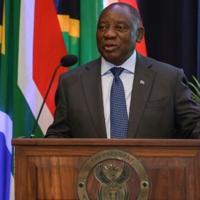President Cyril Ramaphosa is set to present the new government’s vision for South Africa on Thursday, as he opens parliament following the recent elections in May which led to his long-ruling ANC forming a coalition.
Ramaphosa, aged 71, will deliver a speech to the joint sitting of the two Houses in Cape Town at approximately 7:00 pm (1700 GMT) following a ceremony featuring military pageantry and a 21-gun salute.
“This address is truly historic given the unique, complex, and challenging political circumstances in which it is taking place,” stated parliament speaker Thoko Didiza during a Wednesday press briefing.
Weakened by corruption scandals and a weak economic performance, the African National Congress (ANC) lost its parliamentary majority for the first time in thirty years during the May 29 elections, securing only 40 percent of the vote.
This outcome reflects a growing sense of disillusionment since the advent of democracy in 1994, characterized by record-high unemployment rates, widespread poverty and crime, and unreliable access to basic services such as water and electricity.
Following the elections, the ANC formed an unprecedented power-sharing arrangement with 10 other parties, aligning itself with the center-right to attract investors. The party retained key cabinet positions, including foreign affairs, finance, defense, justice, and police.
Among its coalition partners, the Democratic Alliance (DA) received six portfolios, including agriculture, public works, and communication. Various other ministries were allocated to parties such as the Zulu nationalist Inkatha Freedom Party, anti-immigration Patriotic Alliance, and right-wing Afrikaans party Freedom-Front Plus.
– Challenges and Opportunities –
While the cabinet’s initial meeting was marked by a friendly atmosphere, analysts warn of potential challenges ahead.
“There is a sense of goodwill that has been established in the early weeks of the national unity government. The question remains whether this goodwill is sustainable,” remarked political analyst Daniel Silke.
Policy disagreements are expected to arise, ranging from foreign affairs to healthcare reform, an issue supported by the ANC but opposed by the DA.
In his address, Ramaphosa is likely to focus on less controversial policies, such as reforming the corruption-ridden public service, according to governance professor William Gumede.
DA leader John Steenhuisen anticipates Ramaphosa outlining a reform agenda aligned with the DA’s approach to stimulating investment, economic growth, and building a competent state.
The government is expected to face robust opposition from groups like uMkhonto weSizwe (MK) and Economic Freedom Fighters, which placed third and fourth in the May elections. The MK, led by former president Jacob Zuma, gained significant support and could challenge the ANC, drawing on disillusioned ANC members who are familiar with internal workings.
“They know where the skeletons are buried,” commented Gumede, referring to former ANC politicians within the MK ranks.
ub/br/rox





